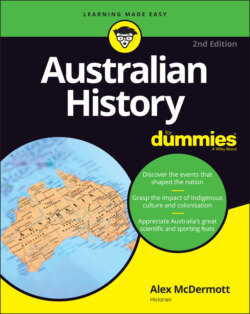Читать книгу Australian History For Dummies - Alex McDermott - Страница 85
Diversifying trade and production
ОглавлениеLike Hunter, King was a veteran of the First Fleet, and so had burned on his memory the original hardships and squalor of the foundation years. He arrived with one very strong official injunction — Cut Down Costs. The colony, said the Colonial Office (and this is only slightly paraphrased), is costing a bomb. Do something about it.
Which King did. For a start, he stopped assigning so many convicts as free labour to private farmers. He also re-established public farms so he was no longer forced to purchase foodstuffs to feed those convicts still being kept by the government.
King attacked inflation and the ruinously high prices being charged in the colony by effectively managing the government store. King developed the government store into a real alternative to the stores run by the emancipist (ex-convict) traders, some of who were charging frankly extortionate prices. King’s attack on inflation was also helped by a glut of incoming commodities and imports. Prices dropped naturally, but at least he was putting in place structures that could permanently assist the settlers.
King also vigorously championed a more diversified economic life in the colony, figuring that if everyone was a simple small-scale farmer (as Britain’s original plan had it), there’d be no-one to buy the surplus crops that the farmers produced.
Having people involved in a range of different industries actually helped those tilling the soil, because they provided a market for what the farmers grew. Not rocket science maybe, but a bit of a conceptual breakthrough. King encouraged entrepreneurs to set up local manufactures, and to further explore trading possibilities in the Pacific region.
King, a keen fan of economist and philosopher Adam Smith’s writings about free trade and enterprise, encouraged the development of new industries wherever they looked like becoming profitable. Under his watch, trade with the South Pacific — in pork, sandalwood, and the occasional human head — all flourished, even though King was also tasked with enforcing the East India Company’s trade monopoly, and countering the highly devious and admittedly quite brilliant ruses employed by the mostly ex-convict businessmen to get around these regulations. King also did much to ensure the whaling grounds near Port Jackson (which American boats were discovering and exploiting at the same time) were actively developed, as well as heavy sealing in Bass Strait. Local industries were encouraged as well; weaving, ship building, leather tanning, textile weaving and dying, pottery and glassblowing, as well as the manufacture of shoes, hats, blankets, soap and candles, all expanded dramatically as traders, forced out of the easy profits to be had from selling high-priced imports, began to think more laterally.
